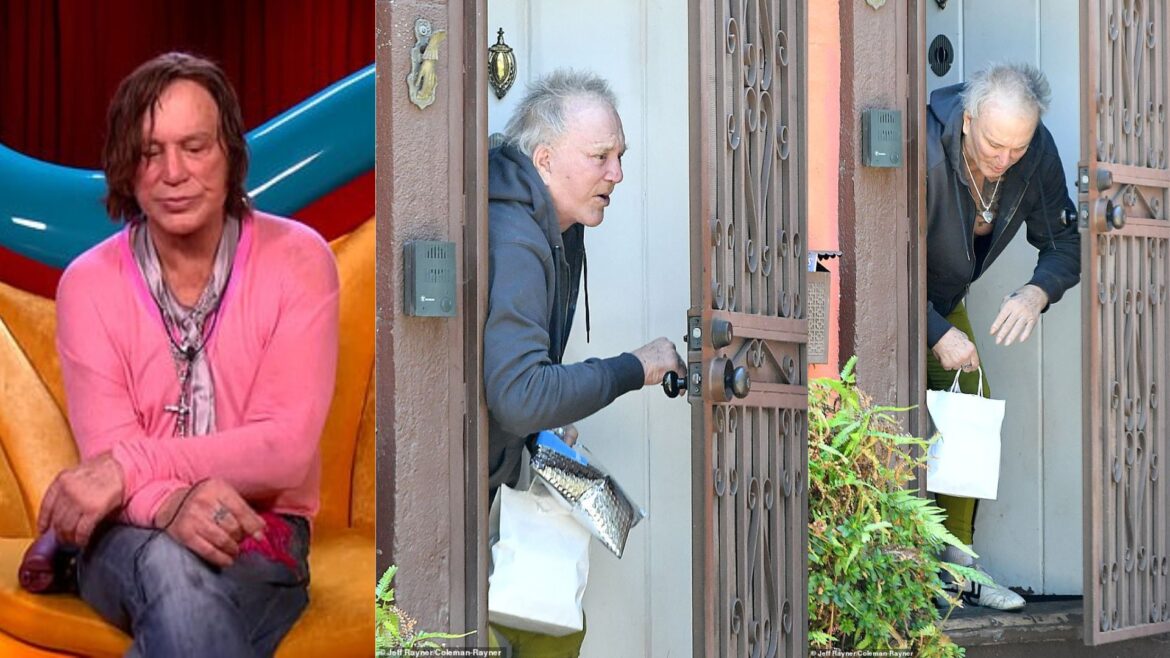Mickey Rourke’s life has always been anything but ordinary.
Once the brooding, smoldering star of 1980s Hollywood, today he’s more likely to be recognized for his headline-grabbing antics than his acting roles.
Earlier this year, the 73-year-old made waves on UK Celebrity Big Brother, appearing with a hairpiece and face that many compared to a deranged Chucky doll—far from the sultry leading man of his heyday.
Swagger That Won’t Quit
Even a botched appearance couldn’t dim Rourke’s audacious personality.
“If I stay longer than four days you won’t be gay anymore,” he cheekily told fellow contestant, openly queer singer JoJo Siwa, who politely declined his advances.
But a profanity-laden outburst and a homophobic slur soon landed him back on the exit path, a familiar indignity in a career filled with soaring highs and painful lows.
A Life Weathered Like His Home
Today, Rourke is 73. Much like his time-worn Beverly Hills home, the star has seen better days.
A former business partner once described him as “the most destructive human being,” a sentiment that echoes through his personal and professional life.
Exclusive photos from last month show the gray-haired actor peeking out from his chipped front door—reportedly, he’s rarely left the house since his early departure from the reality show, which he is now suing over unpaid fees.
His manager told People that Big Brother “publicly embarrassed him,” despite knowing about his Hollywood rebel image.
The Icon Behind the Infamy
Rourke’s fall from grace is striking when you remember his legendary 1986 performance in 9½ Weeks.
Playing John Gray, a manipulative Wall Street broker, he drew audiences into a world of erotic tension with his co-star Kim Basinger.
At 34, he had Hollywood at his feet—but his volatile personality and personal demons slowly eroded that promise.
Talent Meets Turmoil
Bruce Rubenstein, Rourke’s former producing partner, told the Daily Mail, “There’s no reason why—even in his seventies—Mickey couldn’t still have the career of a Clooney or Cruise if he’d stayed away from cosmetic surgery and navigated the system better.
He’s one of the best actors of his generation, but also the most destructive human being I’ve ever met.”
The Rebel of the ‘80s
Rourke’s 1980s filmography reads like a masterclass in cool: Diner, Barfly, Body Heat.
He was often compared to James Dean and Marlon Brando, trained at the famed Actor’s Studio, and quickly gained a reputation as a rebel without a cause.
At 20, he stormed out of an acting workshop after being criticized, a hint of the unpredictability that would later define his career.
Hollywood vs. Mickey Rourke
His rebellious streak didn’t just charm—it alienated.
Producer Xochi Blymyer recalls working with him on 1989’s Johnny Handsome: “He’d sometimes yell at crew through the intercom over small things, like refusing to change his shirt for continuity issues.
Directors would just shrug and move on.”
Rourke’s personal life mirrored his career chaos.
A tough childhood with an allegedly abusive stepfather led him to boxing, channeling trauma into both the ring and his craft.
But self-destructive choices—like ill-advised cosmetic surgery and volatile relationships—kept undermining his professional trajectory.
Peaks and Pitfalls
The 1990 film Wild Orchid was meant to recapture the sensuality of 9½ Weeks, reuniting him with writer Zalman King.
Critics panned it as soft porn, and both Rourke and his co-star (and future wife) Carré Otis earned Razzie nominations.
Behind the scenes, Rourke’s face had been badly damaged in a sparring session with boxing legend Tommy “The Hitman” Hearns, complicating production and contributing to the movie’s chaotic reputation.
Love, Loss, and the Ring
Rourke’s marriage to Otis was tumultuous, marked by violence and substance abuse.
Arrests for spousal abuse followed (later dropped), and frustrated by Hollywood’s setbacks, Rourke stepped into professional boxing for three years.
Even then, his disdain for the industry remained sharp: in a 1994 interview, he called actors “a bunch of c****” and criticized Warren Beatty as “one of the creepiest puke asses I’ve ever met.”
A Rocky Comeback
After turning down major roles in films like Rain Man and Platoon, Rourke returned to Hollywood with a straight-to-video sequel, Another 9½ Weeks.
Yet the real comeback arrived in 2007 with The Wrestler.
As Randy Robinson, an ageing wrestling legend, he channeled his personal struggles into a performance that earned him an Oscar nomination and reminded the world of his acting brilliance.
Reality TV and the Rebel Spirit
Even after The Wrestler, Rourke’s Hollywood revival was fragile.
In the Big Brother house, he refused to play the game, remaining a rebel among has-beens and reality TV hopefuls.
Despite his almost unrecognizable appearance, he remained a magnetic presence, proving that his star power—like his fighting spirit—doesn’t fade easily.
What’s Next for Mickey Rourke?
At 73, Mickey Rourke is still the eternal rebel.
Whether Hollywood will offer him another chance depends on a daring director and a role worthy of his complex persona.
One thing’s certain: he’s never been one to fade quietly into the background, and the world is still waiting to see if the next act of his life will be his boldest yet.
